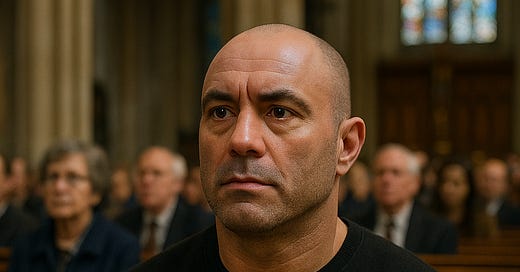Who will shepherd Joe Rogan?
The intersection of internet culture, podcasts, and young men showing up in your church Sunday.
Joe Rogan, former Fear Factor host, top Podcaster, and raunchy standup comedian, now… goes to church?
I know what you’re thinking: Why should I care?
In this brief blog, I aim to explore the intersection of podcast culture and the local church you attend or lead.
To show this is more than a shot in the pan moment, in the last 3 months:
Chris Williamson, in his podcast Modern Wisdom, recently hosted Girls Gone Bible with the theme: Is Church the New Counterculture?
Biblical scholar Wesley Huff has appeared multiple podcasts, notably Andrew Schulz’s and Akaash Singh’s Podcast and Joe Rogan’s Podcast.
Jordan Peterson debated 20 atheists and was viewed 6.3 million times as of the time of this writing.
Douglas Murray, Jonathan Pageau, Bret Weinstein have all spoken positively about Christianity in various forms. I write more about that in my post, Manosphere’s Search of Meaning.
Although I know none of those above names personally, I do see the residual effects of their voices impacting local congregations, as well as some counterintuitive insights I have gained as someone who enjoys podcasts and hymns. Here is how the church can embrace those influenced by podcast and internet culture.
Prioritize depth instead of hype. Several of the podcasts mentioned above run over three hours. As a church leader, consider how to facilitate nuanced discussions that explore both theological and societal complexities. This is not optional. Simplistic, clichéd, 3 point sermons that alliterate will fail to resonate with someone who holds the world in their hands (or in their pocket). Embrace the challenge of discussing intricate topics and approach them with intellectual honesty and spiritual humility when faced with uncertainty.
Issue a challenge over convenience. The same individuals who indulge these voices are not the same individuals who want to attend a Saturday morning breakfast for men talking about sports, movies, or their lawns. Society has instructed them to “follow their heart,” yet this has resulted in a sense of emptiness. Point them to Jesus and to carry their cross.
Provide engagement over mockery. The late Tim Keller was masterful of this: instead of mocking society, find ways to close loops that they are hearing through their AirPods Monday-Saturday. “Jordan Peterson says we all should live as if God exists; it’s an interesting idea, yet incomplete. Jesus didn’t introduce a moral behavior framework on how to live pragmatically, but an invitation to know Him personally and here is how…”
Emphasize congruence over platitudes. As mentioned in point 1, knowledge alone doesn’t transform lives; it’s the application that matters. Consider how you interact with your staff, spouse, children, congregants, and community, as that is the loudest sermon you will preach. Delivering a 30-minute message on Sunday is one thing; demonstrating how faith manifests in your life is quite another.
Joy over Puritanism. If the men attending your church on Sunday are influenced by the names mentioned above, they may appear a bit rough around the edges. However, they are not alone; Jesus’ disciples were not the most squeaky-clean guys either. It is crucial to cultivate a church culture where individuals can belong even before they believe and where belonging takes precedence over behavior. If you take this path, you will get dirty.
I don’t know what the Spirit is doing at the intersection of podcast culture and faith, but I do know we are seeing more young men wandering into churches looking for answers. May we be there to welcome them with open arms.




